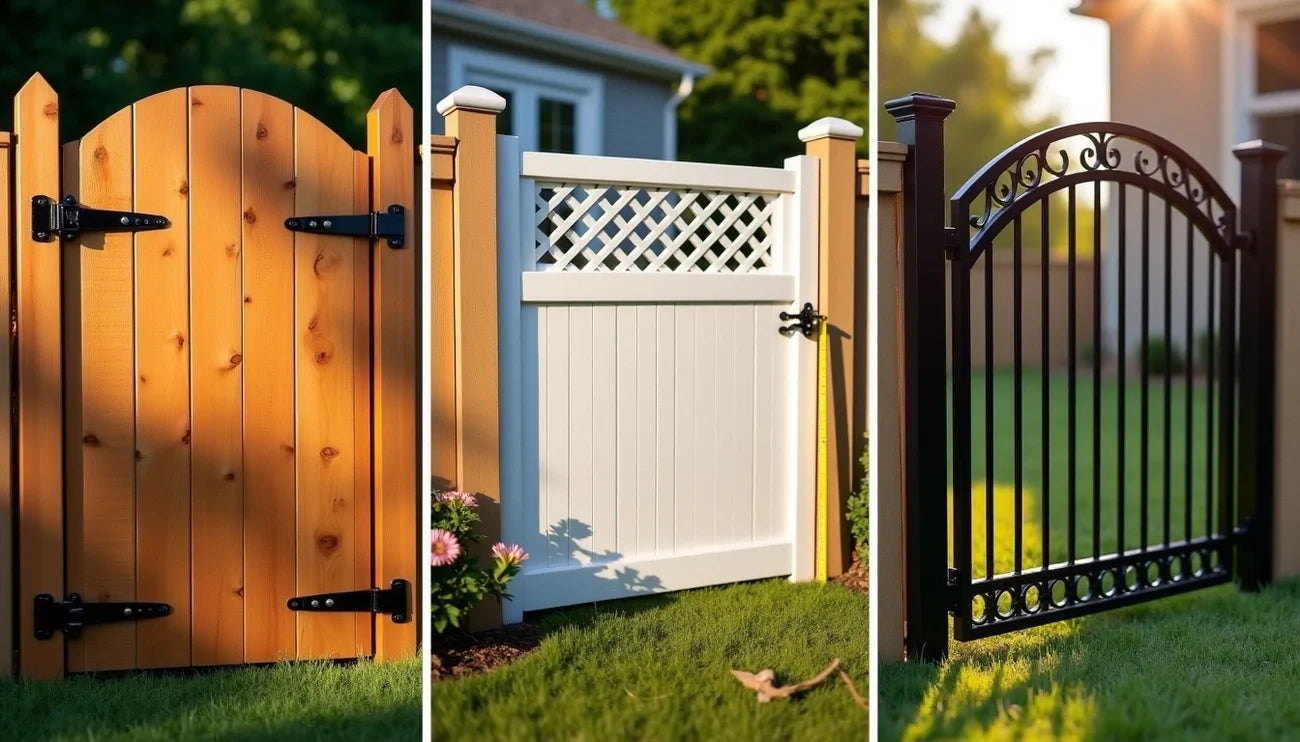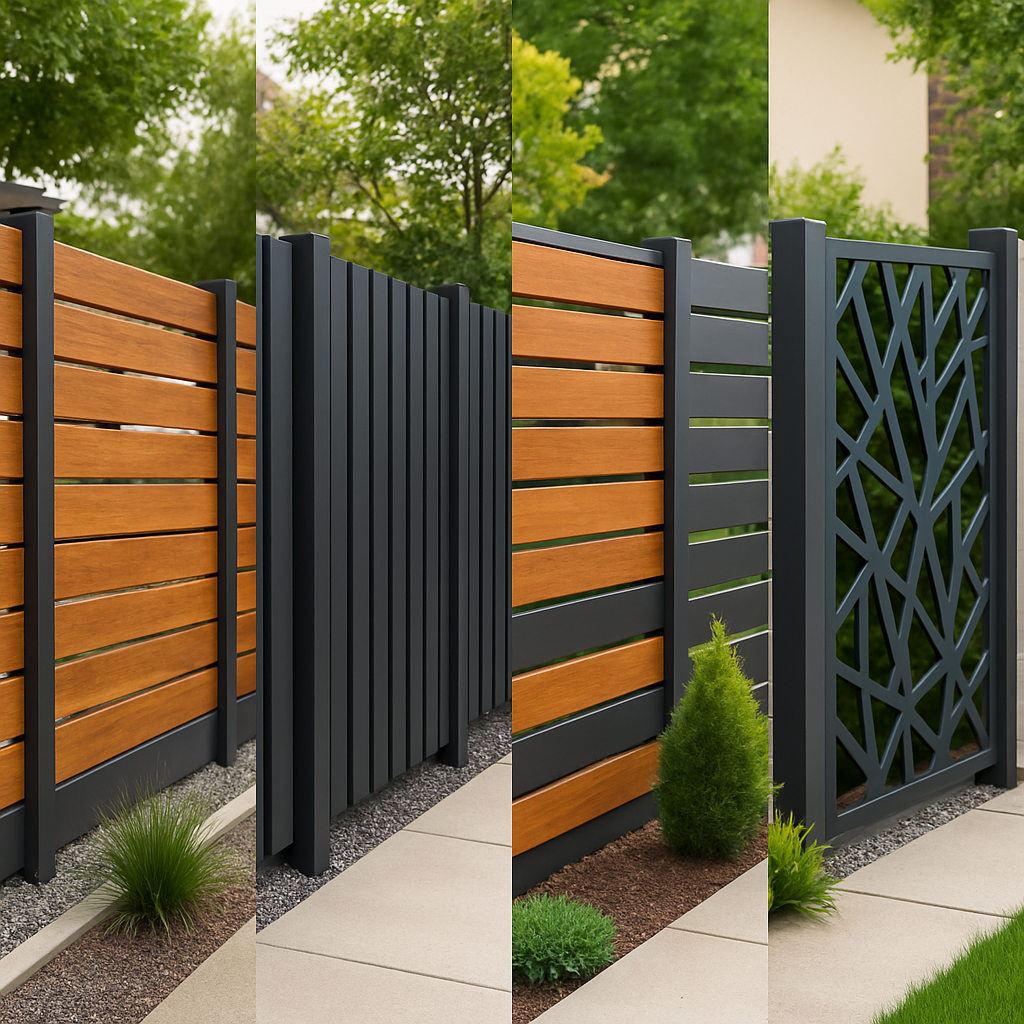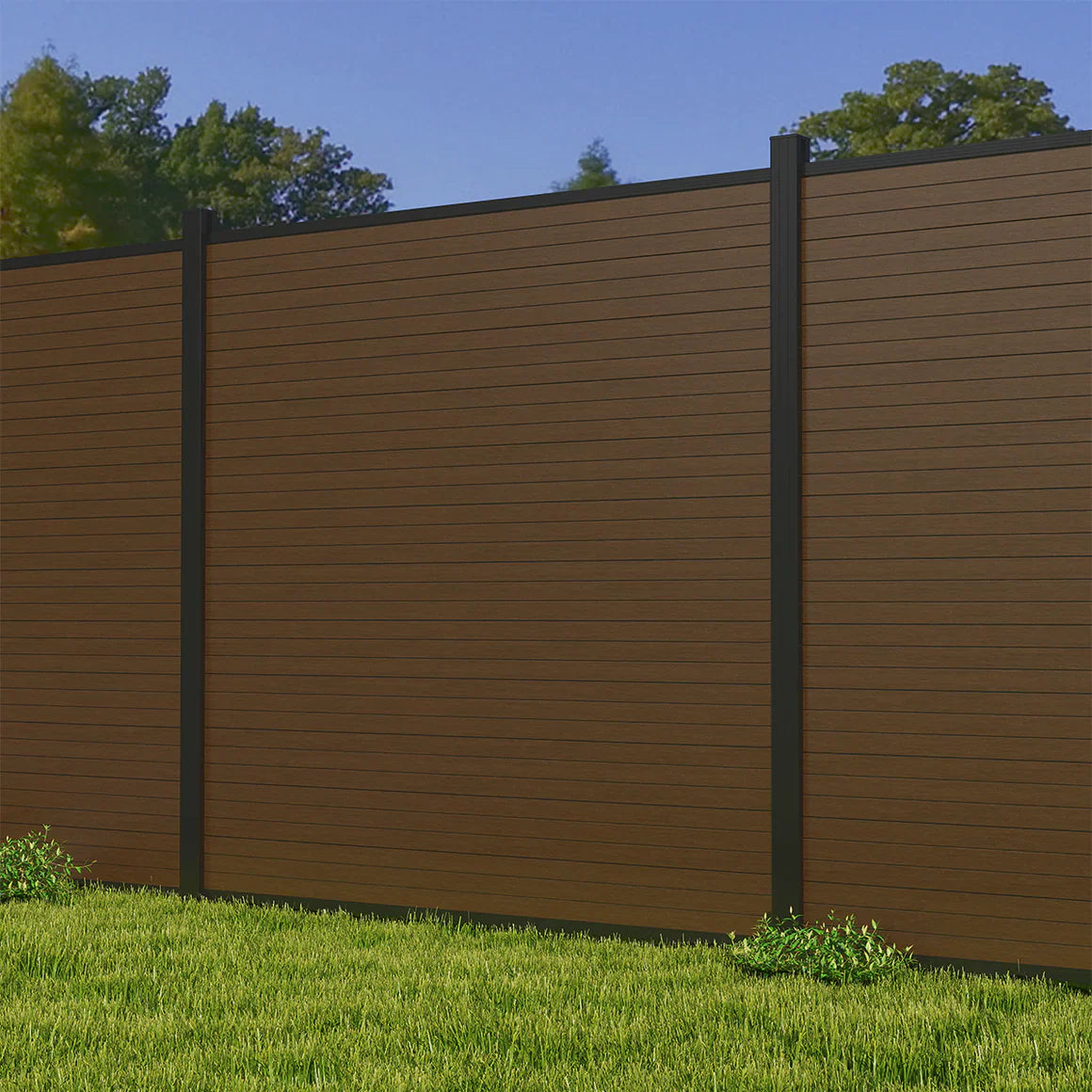
Fence Gate Buying Guide: What Experts Won't Tell You About Materials
Choosing the right fence gate for your property can feel overwhelming when faced with so many material options. I've discovered that while wood fence gates remain the most economical choice compared to vinyl or composite alternatives , many homeowners aren't given the complete picture about material trade-offs before making their purchase.
When shopping for fence gates, we often hear about the benefits but rarely the drawbacks of each option. Whether you're considering a wooden fence gate known for its classic appeal, a vinyl fence gate prized for durability, a metal fence gate offering superior strength, a privacy fence gate to shield your yard from neighbors, or an aluminum fence gate that resists rust - each material comes with its own set of compromises. For instance, high-quality composite doors feature excellent waterproof properties , but is that worth the additional investment? Additionally, custom gate design services can create gates from nearly any material to fit specific openings , though this flexibility often comes at a premium.
In this comprehensive guide, I'll walk you through what fence experts might not tell you about different gate materials, helping you make an informed decision rather than one you might regret later.
Understanding Fence Gate Materials
"Metal is resistant to pests, rot, and warping making it an excellent option for lasting security." — Montco Fence Experts, Professional fence installation company specializing in secure and durable gate solutions
Wooden fence gate: classic and cost-effective
Wood remains the most traditional and budget-friendly fence gate material on the market. If properly maintained, a wooden gate can last more than a decade without replacement. Despite being weaker than metal, wood offers impressive strength and durability for most residential applications. Furthermore, wooden gates typically provide better privacy than metal alternatives since they're usually solid without gaps. For environmentally conscious homeowners, wood stands out as one of the most eco-friendly options since it's sustainable and requires minimal chemical processing.
Vinyl fence gate: low maintenance and durable
Vinyl has earned its reputation as a virtually maintenance-free option that won't rot, blister, or allow fungus growth. In fact, vinyl fence gates can last for decades with almost no upkeep beyond occasional cleaning with soap and water. These gates won't splinter, making them particularly child-friendly. In contrast to wooden gates, vinyl comes in various styles, including privacy designs with no gaps between panels as well as decorative options with lattice details. Vinyl is essentially weatherproof, able to withstand harsh conditions without breaking, warping, or cracking.
Metal fence gate: strength and style
Metal fence gates primarily consist of steel, stainless steel, or wrought iron, each offering superior strength and security. Steel stands out as the strongest option, making it ideal for high-security applications or busy entryways. Metal gates come in numerous designs, from simple tubular styles to elaborate ornamental patterns that add visual interest. Notably, modern metal gates often feature powder coating finishes that extend durability while allowing for color customization.
Aluminum fence gate: lightweight and rust-resistant
Aluminum offers a compelling combination of benefits that other materials can't match. Above all, aluminum is naturally rust-resistant because it lacks iron, the key element that causes rust. When exposed to oxygen, aluminum forms a protective oxide layer that prevents corrosion. This makes it particularly well-suited for coastal areas with high humidity or rainfall. As a non-ferrous metal, aluminum gates are significantly lighter than steel or iron alternatives—approximately 2.5 times lighter than steel—yet still provide adequate security for most residential needs.
What Experts Don’t Tell You About Material Trade-Offs
Beyond the sales pitch lies the reality of fence gate ownership. What many salespeople won't mention are the crucial trade-offs that impact your long-term satisfaction with different materials.
Hidden maintenance costs over time
Wooden fence gates may seem affordable initially, nevertheless, they require regular staining or painting every 2-3 years to prevent deterioration. Unlike wood, vinyl gates demand minimal upkeep but can crack in extreme temperatures, leading to replacement costs rather than simple repairs. Meanwhile, wrought iron gates need periodic rust removal and repainting despite their durability. Aluminum stands out as truly low-maintenance, typically requiring only occasional cleaning with soap and water.
Color fading and weather impact
Regardless of quality, wooden gates naturally gray and weather over time unless regularly sealed. Vinyl gates, although marketed as "fade-resistant," can become chalky and discolored after 7-10 years of sun exposure. Metal gates hold color well but may chip if not properly powder-coated. Moreover, regional weather plays a significant role - wooden gates in humid climates face rot issues, whereas vinyl becomes brittle in extreme cold.
Installation complexity by material
Indeed, installation difficulty varies dramatically by material. Wooden gates often require precise measurements and custom cutting on-site. Conversely, vinyl gates typically come in pre-fabricated kits that limit customization options. Metal gates tend to be heavier, frequently requiring additional post reinforcement and specialized hardware to prevent sagging.
How material affects gate sag and alignment
Gate sagging remains the most common fence complaint, yet few experts explain how material choice directly influences this issue. Wooden gates heavier than 4 feet wide commonly sag without diagonal bracing. Accordingly, aluminum offers better long-term alignment due to its lightweight nature. Even well-designed vinyl gates can warp in intense heat, causing alignment problems that affect closure and security.
Choosing the Right Gate for Your Needs
The perfect fence gate balances functionality with esthetics to serve your specific property needs. Your selection should prioritize practical requirements first, yet remain visually appealing.
Privacy fence gate vs. decorative gate
For complete seclusion, solid panel gates with minimal gaps provide optimal privacy. Gates standing 6 feet or taller offer maximum screening from outside view. Alternatively, decorative gates enhance curb appeal and often serve as focal points that draw attention upon arrival.
Matching gate type to fence material
Gates should complement your existing fence for visual harmony. Wooden fences pair naturally with wooden gates, whereas metal fences match beautifully with corresponding metal gates. Hybrid designs (like wood with metal framing) combine warmth with structural strength. Pre-built gates simplify matching by offering various sizes and finishes compatible with most fence styles.
Security considerations for residential gates
Security-focused gates require sturdy construction with heavy-duty hinges and reinforced latches. Consider additional features like deadbolts or keypad entry systems for enhanced protection. Metal gates, primarily steel, provide superior strength against tampering, especially when equipped with anti-tamper systems.
Climate and regional factors to consider
Vinyl gates excel in humid environments by resisting rot and moisture. Aluminum performs exceptionally well in coastal areas where salt air damages other materials. Upon selecting materials, evaluate your local weather patterns—extreme temperatures can cause vinyl to become brittle or wooden gates to warp significantly.
Installation and Long-Term Considerations
The long-term success of your fence gate largely depends on proper installation and consistent maintenance. This final investment phase determines whether your gate will last years or decades.
DIY vs. professional installation
Professional installation typically offers superior results, primarily for complex materials like metal gates requiring precise alignment. No-dig installation methods save time by eliminating post holes yet utilize stronger aluminum posts for durability [1]. Alternatively, DIY installation can cut costs by nearly half, yet requires careful planning, utility line marking, and proper post setting techniques.
Gate hardware compatibility issues
Quality hardware makes or breaks a gate's functionality. Standard gate latches often won't work with thicker custom gates (4.5-5 inches) [2]. Vinyl gates require stainless steel hinges that can withstand twisting forces - box store hinges frequently fail during storms [3]. Consequently, stainless steel powder-coated black hinges ($55 per set) outlast wood gate hardware ($8 per set) [3].
How to prevent warping and sagging
To prevent sagging, install diagonal braces angled downward toward the lower hinge [4]. For vinyl gates wider than 5 feet, add a secondary diagonal brace [3]. Generally, concrete footings 3 feet deep for vinyl gates provide proper support [3]. Yet turnbuckles offer an effective solution for already sagged gates, gradually pulling corners back into alignment [5].
Warranty and lifespan differences by material
Aluminum offers a transferable limited lifetime warranty against peeling, flaking, and corrosion [6]. Conversely, vinyl typically comes with a transferable limited lifetime warranty [6], lasting 20-30 years with minimal maintenance [7]. Even if wood has just a one-year warranty [6], proper maintenance extends its lifespan to 10-15 years [7].
Tips for seasonal maintenance
Firstly, perform thorough spring cleaning to remove winter debris. Throughout summer, check for warping from heat and apply UV protection. During fall, clear debris and secure loose components. Henceforth, protect against winter's snow buildup and freezing by lubricating hardware regularly [8].
Conclusion
Selecting the right fence gate ultimately comes down to balancing your specific needs with the inherent trade-offs of each material. Throughout my research, I've found that wood offers classic appeal and affordability but demands regular maintenance. Vinyl provides exceptional durability with minimal upkeep, though it may become brittle in extreme temperatures. Metal gates deliver unmatched strength and security, yet require protection against rust. Aluminum stands out as a truly practical option for coastal areas due to its natural rust resistance and lightweight properties.
Your climate should significantly influence your decision. Homeowners in humid regions might want to avoid wood gates unless they're willing to commit to regular sealing. Similarly, those in areas with extreme temperature fluctuations should carefully consider how vinyl might perform under such conditions.
Beyond material selection, proper installation remains crucial for long-term satisfaction. A perfectly chosen gate will still fail if poorly installed. Therefore, consider whether DIY installation aligns with your skills or if professional help would better ensure lasting performance.
After all, fence gates serve as both functional elements and esthetic statements for your property. The right gate not only secures your space but also enhances your home's overall appearance. Armed with this knowledge about what experts often gloss over, you can now make a confident decision that suits your budget, maintenance preferences, and regional conditions. Your ideal fence gate balances immediate costs against long-term value while complementing your property's unique character.
References
[1] - https://thefencecompany.com/
[2] - https://www.finehomebuilding.com/forum/fence-gate-hardware
[3] - https://bryantfence.com/top-5-problems-with-vinyl-gates/
[4] - https://www.instructables.com/Build-a-Wooden-Fence-and-Gate/
[5] - https://www.fox2detroit.com/news/tips-for-fixing-up-a-warped-fence-gate
[6] - https://www.peerlessfence.com/resources/warranty/fence-warranty
[7] - https://www.riograndefence.com/blog/understanding-the-lifespan-of-different-fencing-materials
[8] - https://williamgatemaintenanceservice.com/why-seasonal-maintenance-is-key-for-fence-gates/



Leave a comment
This site is protected by hCaptcha and the hCaptcha Privacy Policy and Terms of Service apply.